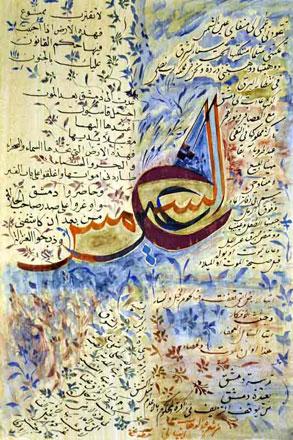You are here
Culture minister, TV veterans call for improving presenters' Arabic language skills
By Rana Husseini - Jan 19,2016 - Last updated at Jan 19,2016

A poster of Arabic calligraphy released by UNESCO in 2014 on the occasion of the World Arabic Language Day, marked on December 18 (Photo courtesy of UNESCO)
AMMAN — Culture Minister Lana Mamkegh and veteran TV anchors say there is an obvious problem with the language used on Jordanian TV channels, urging the institutes to enrol their employees in Arabic training courses.
“There is an obvious problem with the use of language and the utterance of certain words or sounds by some local TV presenters,” Mamkegh told The Jordan Times in a recent interview.
The minister was quick to add that “it is not the fault of the news presenters, because many of them do not go through training to master the proper techniques”.
Former director of Jordan Television Ibrahim Shahzadah, who has been a news presenter for 45 years, agreed with Mamkegh.
“I am not content with the performance of some TV anchors. They read what is written for them like parrots,” Shahzadah told The Jordan Times on Tuesday.
“If we want successful TV presenters, they have to work on themselves,” he asserted.
Shahzadah, who wrote a book about his experience with over 7,000 news bulletin reads, mostly at Jordan Television, said the secret lies with simplicity.
“Many teachers helped me in school and in my early career. One teacher advised me to simplify things and to focus on the content of the news item,” he added.
Shahzadah said he used to rewrite the news items, starting with the most important to the least important while at the same time replacing difficult words with simple ones.
“This practice helped me connect with my viewers, and — at the same time — be aware of what I'm saying and how I say it. I believe this is lacking among our TV presenters these days,” he explained.
Lana Atyat, a TV presenter and producer at Jordan Television for the past 19 years, said another phenomenon common among TV presenters is the “Lebanising of the language”.
“Many anchors are using the Lebanese accent because they believe it is more attractive, and this is really bad for our profession,” Atyat said.
She told The Jordan Times that “anchors should be encouraged to use the 'white accent', which is the common language used by people in Jordan.”
“It is best that each TV presenter uses his/her own common language and stays away from being pretentious. It is best just to be yourself,” Atyat added.
Mamkegh, Shahzadah and Atyat all agreed that the key lies in professional training courses that enable presenters to identify any pronunciation problems, work on their speaking skills and their posture in front of the microphone.
Earlier in January, the Jordan Academy of Arabic sent a letter to Minister of State for Media Affairs and Communications Mohammad Momani on the use of colloquial Arabic in the content of TV channels, newspapers and other media outlets.
The academy, which monitored and observed media outlet content, said the editing of Arabic content in television news is weak.
The language used during talk shows is also close to colloquial Arabic, which is “inappropriate”, the academy added.
Related Articles
AMMAN — Colloquial Arabic dominates the content of TV channels, newspapers and other media outlets, according to the Jordan Academy of Arabi
AMMAN — Romanian Ambassador to Jordan Bogdan Filip on Monday presented books to the National Library Department (NLD) as part of both countr
AMMAN — The Lower House Education Committee on Sunday met with Culture Minister Lana Mamkegh and a number of specialists from the ministry a













